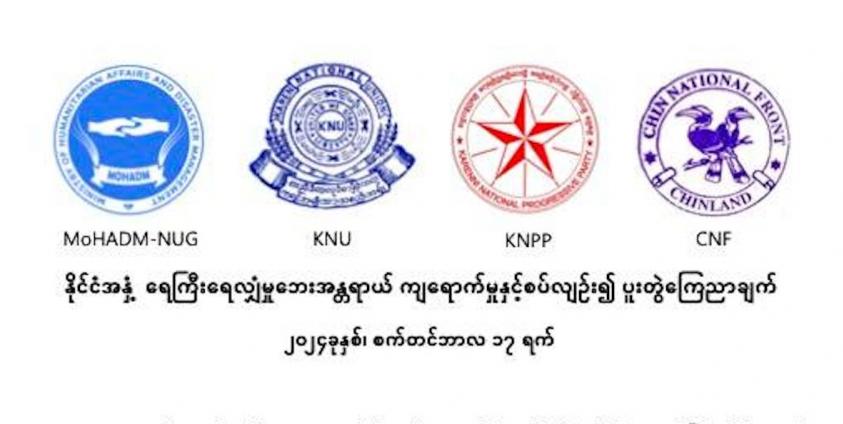The National Unity Government (NUG), Karenni, Karen, and Chin ethnic resistance forces issued guidelines for the United Nations, European Union, ASEAN, international and local humanitarian organisations who want to offer flood relief and aid to communities in Myanmar.
The guidelines came in a joint 17 September 2024 statement issued by the NUG’s Ministry of Humanitarian Affairs and Disaster Management (MoHADM) and the ethnic resistance K2C group, made up of the Karen National Union (KNU), the Karenni National Progressive Party (KNPP), and the Chin National Front (CNF).
It said that following the widespread flooding and landslides caused by the tail end of Typhoon Yagi, in Shan, Karenni, Chin, and Karen states, and Mandalay, Bago, Sagaing and Magwe regions it had the eight following recommendations for the United Nations (UN), the European Union (EU), the Association of Southeast Asian Nations (ASEAN), and other domestic and international organisations when providing humanitarian assistance to the flood-affected people of Myanmar:
(i) To make sure that emergency humanitarian assistance and health care support reach the flood-impacted people fairly and equally.
(ii) To deliver direct support to the designated personnel of the Ministry of Humanitarian Affairs and Disaster Management, EROs and local CSOs/CBOs at the community level.
(iii) To ensure that humanitarian aid is not politicised or weaponised.
(iv) To support both short-term and long-term assistance ranging from emergency relief to rehabilitation and reconstruction.
(v) Despite shrinking global funding, to advocate international donors to support the Myanmar people who are bearing the double burden of natural and manmade disasters simultaneously.
(vi) To transparently inform the people about the international support to flood-hit populations.
(vii) To take account of the special needs of the most vulnerable groups in the disaster and to conform to the fundamental principle of Humanitarian Imperative.
(viii) To manage aid effectively and systematically monitor aid distribution.
An estimated 631,000 people across 59 townships in Myanmar have been affected by the recent widespread floods. The death toll has risen to hundreds, with many more reported missing due to the floods, landslides, and other related disasters. Many areas remain submerged, and urgent relocation and humanitarian assistance are critically needed.
Kalaw Town in southern Shan State, areas around Naypyidaw, Taungoo Township in Bago Region, as well as Magway Region and Sagaing Region, were the worst affected by floods and landslides, resulting in hundreds of casualties.
In their statement the MoHADM and K2C said they were “striving in their fullest capacity, to carry out emergency relief and response interventions for the flood affected populations.”
It added that they were trying to provide flood victims with “food, clean water, basic commodities and shelter, health care, water, sanitation and hygiene,” and said that houses and infrastructure need to be rebuilt in flood affected areas.
The statement also expressed support for flood victims and those helping them, saying: "We stand steadfastly together with the affected people across the country in this adverse situation and share the losses and pains with deep sympathy. We sincerely appreciate the civil society organisations and the well-wishers who are making tireless efforts in the flood relief operations.”
The Restoration Council of Shan State (RCSS) also announced, on 17 September 2024, that it will form relief committees and establish funds to effectively provide assistance to flood-affected people in Shan State by leveraging the resources of international organisations and local and foreign donors. It also invited donors to contribute to such initiatives.
Coup leader Min Aung Hlaing claimed on 13 September that the junta is actively working to expedite the delivery of international aid to flood-affected people.
In reality, the junta has not only failed to take effective action in flood relief efforts but has also been restricting individuals and social aid groups engaged in relief work, and confiscating aid materials, according to aid workers.
During the previous military government’s rule in 2008, when Cyclone Nargis struck, international aid sent to Myanmar failed to reach those in genuine need. Instead, military-aligned officials and their associates exploited the situation by selling the aid materials.
Despite the deadly floods, the junta is continuing to target civilians with airstrikes in areas where there is currently no fighting, according to resistance forces.








